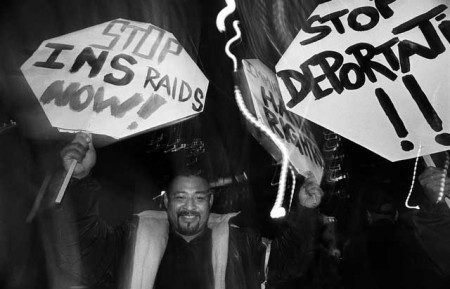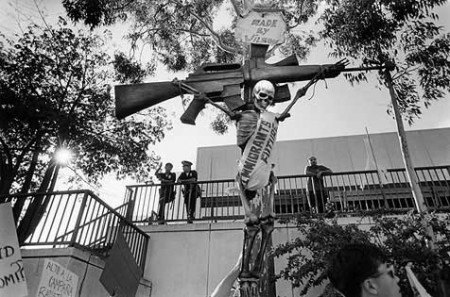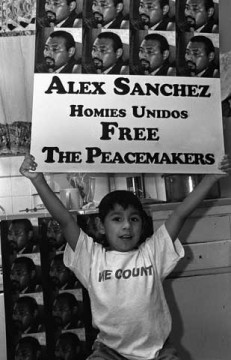Deportation refers to the expulsion of a person or group of people from a place or country. It has been used as a punitive tool by governments throughout history to exile or forcibly resettle. England deported religious dissidents and criminals to the colonies that later became the United States. In the 20th century Stalin and Hitler both used deportation as a tool of ethnic cleansing and genocide.

Alex Sanchez of Homies Unidos at a rally protesting deportation policies faced not only by Central Americans but also by Cambodians.
The United States has also used mass deportation to forcibly resettle Native Americans, to intern Japanese Americans to expel Mexican immigrants. In “Decade of Betrayal,” Francisco Balderrama and Raymond Rodriguez chronicle the deportation of 1 million Mexicans from the United States during the anti-immigrant fervor of the Great Depression. It is estimated that up to 6o percent of those deported were legal United States citizens. Then in 1954 the U.S. government implemented another massive deportation program known as “Operation Wetback.” Although the figures are disputed, the Immigration and Naturalization Services proudly claimed to have repatriated 1.3 million undocumented Mexicans, many from the state of Texas.
These incidents were only two episodes in a constant ebb and flow of Mexican repatriations that occurred in waves from the time of the Mexican American war. Those being deported were often stigmatized and rendered nameless in the US press. It was reading a press account of a plane crash in which Mexican bracero workers were described as “just deportees,” that prompted the famous US folksinger Woodie Gutherie to write the song: Plane Wreck at Los Gatos, also known as Deportee.

Immigrants rights groups protest policies that weaken non-citizen rights and threaten to deny undocumented children access to education or medical treatment.
Article 18 of the 1996 United Nations’ Draft Code of Crimes Against the Peace and Security of Mankind cites “arbitrary or forcible deportation” as a crime against humanity. Ironically that same year the UN was strengthening International law on forced removal, the United States passed legislation that severely weakened protections of rights by limiting the judicial review, which could ensure against “one size fits all” determinations on deportation. Under the 1996 Illegal Immigrant Reform and Immigrant Responsibility Act, if an immigrant is determined to have made an unauthorized entry into the United States, to have overstayed a legal visa, or any of a long list of crimes, the “removal” process is compulsory and swift. While “deportations” remained roughly stable prior to 1996, averaging 20,000 a year, the removal rates have increased by 309% from 1995 to 2003, from 69,000 to 185,000.
A 2008 report by the Pew Hispanic Center estimated that 11.9 million unauthorized immigrants live in the United States comprising 4% of the nation’s population and 5.4% of its workforce. About three-quarters of the nation’s unauthorized immigrants are Hispanic: with 70% of them coming from Mexico and Central America. The data on removals in 2003 show a disproportionate impact on Mexican and Central American immigrants. Although they also accounted for roughly 70% of the undocumented population in 2003, persons from—Mexico, El Salvador, Guatemala, and Honduras accounted for 89% of removals that year.

Alex Sanchez awaiting the results of his deportation case at Terminal Island immigration detention facilty.

Alex Sanchez Jr age 6 holds a poster designed by Homies Unidos a gang violence prevention organizations fighting the government's deportation case against his father — a Homies Unidos activist and former gang member.
Human Rights Watch outlines concerns for the human suffering this causes immigrants and their families in the report Forced Apart: (By the Numbers) published in 2009. One surprising finding—given the controversy over immigration—is that available statistics indicate that only 24% of those deported were convicted for unauthorized entry into the United States. Some crimes, which would be considered misdemeanors for a citizen, make even legal residents deportable.
And harm done to children, spouses and other loved ones is inestimable. Since 1977 more than a million family members have been separated by deportation. Seventy two percent of the immigrants who were banished from the people and the place they consider home—suffered this punishment for a non-violent offense.